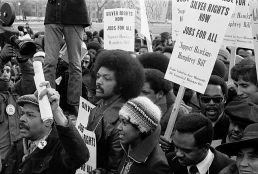If you feel frustrated that there isn’t a reasonable debate, it’s because Netanyahu’s supporters don’t want one
By Christian Sorensen, World BEYOND War
The business of war is very well organized.
How does it influence U.S. government?
Its main tools are lobbying firms, think tanks, law firms, and nonprofit pressure groups. The following map demonstrates how each aids the business of war.

The military budget is at least $886 billion, over half of which goes to corporations. The higher the military budget, the more war corporations (“defense contractors”) make.
The U.S. ruling class profits directly from this corporate activity through executive compensation, shareholder dividends (e.g., LMT, NOC, GD), and stock buybacks, which increase the share price. In the longer term, the ruling class profits from war by buying and selling war corporations (often via private equity) and by prying open economies (e.g., U.S. viceroy Paul Bremer’s edicts opening up Iraq’s economy—from agriculture to telecommunications—to multinational corporations).
The $886 billion could be going to programs that benefit the public (e.g., infrastructure, transportation, housing, nutrition, debt relief) instead of garrisoning the globe and waging elective wars that pollute immensely and kill civilians and the troops.
The business of war must be addressed if the U.S. public ever wishes to establish democracy in the nation’s capital and live in a healthy society. Those who oppose war must be more disciplined and vigilant than those within the mapped institutions.
Methodology
Lobbyists are paid to influence how government officials create policy. Lobbyists meet with members of Congress, their staff, and the top ranks of the Pentagon and State Department. Lobbying disclosure forms kept by the Senate and House provided an address when a lobbying firm’s own website did not. A firm’s “defense” industry clients were found on Open Secrets, unless otherwise indicated on the map. Sometimes, a corporation hires an individual lobbyist directly, not a whole lobbying firm. Those individuals were not mapped. Many lobbyists do not register as lobbyists, and therefore were also not mapped.
A think tank issues information helpful to those who fund the think tank. A think tank funded by fossil fuel corporations, for example, redirects the conversation away from today’s intertwined mass extinction and climate crises. The information it issues aims to sustain the profit-over-people economic system known as capitalism. Think tanks funded by war corporations and/or the U.S. government circulate interventionist narratives and pro-war talking points. They also create and inflate threats, which the Pentagon and intelligence agencies seize in order to justify sky-high budgets and invasive legal authorities. Pundits at think tanks are regularly quoted in corporate media.
A law firm’s “government contracting” division helps corporations do business with the federal government and navigate federal regulation. A law firm can provide other essential assistance: help draft model legislation, which corporate lobbyists offer members of Congress; advise corporations about financing political campaigns; and advise corporations in mergers and acquisitions. Firms’ websites often brag about their revolving-door credentials (e.g., many of their “attorneys have worked at government and regulatory agencies—the same bodies before which they now represent clients,” many of their “lawyers possess an invaluable perspective garnered from years of experience in prior government service”). A law firm that has a dominant lobbying division (e.g., Akin Gump Strauss Hauer & Feld LLP, Steptoe LLP, Venable LLP) was mapped as a lobbying firm, not a law firm.
Nonprofits apply additional pressure on U.S. government. 501(c) classifications are listed at Charity Navigator and the advantages of the relevant classifications are detailed at Open Secrets, which also explains how “dark money” works. Depending on its nonprofit classification, a 501(c) can “educate constituencies,” communicate with the Pentagon, write letters to Congress and federal executive departments stating industry’s position on business matters, issue reports, coordinate messaging across the industry, sponsor recreation (e.g., the Army Ten-Miler), give awards to active-duty officers (e.g., NDIA’s Eisenhower Award), or administer arms fairs and other events during which military leaders, politicians, and corporate representatives network and make deals. Additionally, there is plenty of room for certain 501(c) organizations to lobby, as a D.C. law firm explains (pdf). Some of the financial industry’s nonprofit pressure groups are included on the map because the financial industry sits atop the business of war: Asset management firms hold a lot of war corporations’ stock, large banks provide loans and lines of credit to war corporations, private equity firms buy and sell war corporations, and venture capitalists invest in startups. Big business incorporates new nonprofits every year.
All four tools (lobbying firms, think tanks, law firms, nonprofit pressure groups) are waystations for individual war profiteers and top bureaucrats who revolve around government and industry.
Christian Sorensen is a researcher focused on the business of war. He is the authority on the bundling of military and big business. A U.S. military veteran, he is the author of Understanding the War Industry (Clarity Press). His research is available at warindustrymuster.com. Sorensen is a senior fellow at the Eisenhower Media Network (EMN).
Recent Posts
‘The Siege Must Be Broken’: Countries Called to Ship Fuel to Cuba After Trump Tariffs Struck Down
February 21, 2026
Take Action Now The US Supreme Court’s ruling “implies that Trump’s recent order imposing tariffs on countries selling oil to Cuba exceeds the…
Elite Depravity in Imperial Decline, A Zero Hour Conversation With Richard Wolff
February 20, 2026
Take Action Now “The system self-selects for psychopathy… the most sociopathically obsessive competitor and accumulator of personal power and…
Economics of Health For All: The Plan to Put Health at the Heart of the Global Economy
February 20, 2026
Take Action Now At the World Health Assembly in May, member states may endorse an unprecedented strategy declaring that health is not a cost – but…
The Left Owes a Lot to Jesse Jackson
February 19, 2026
Take Action Now As a movement builder, spokesperson, and candidate for the presidency, Jesse Jackson’s accomplishments were massive. He was one of…




